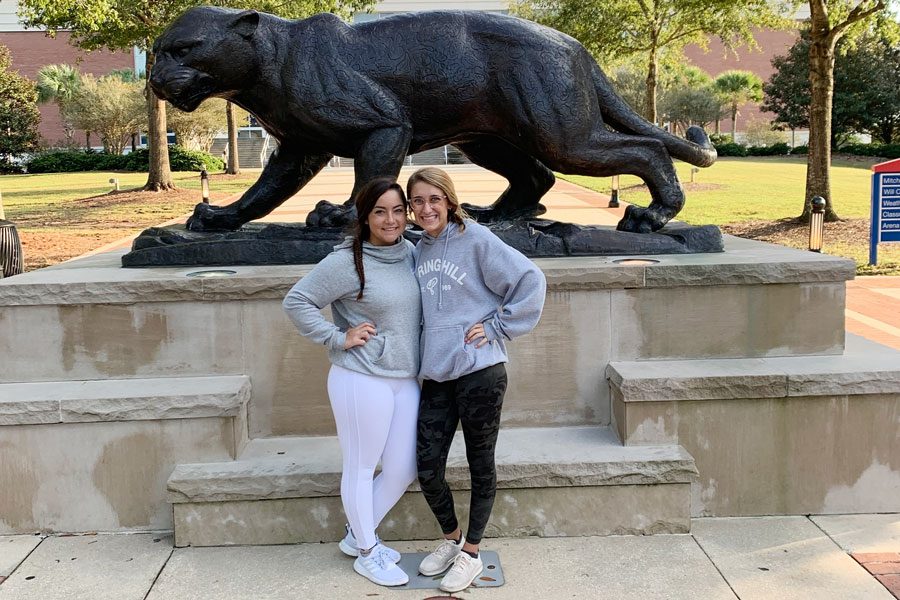Experts tell how to have a successful college visit
Virtual visits to campus are also an option
On Oct. 16, seniors Hannah Miller and Andi Manship visited the University of South Alabama.
As more universities every year adopt the common application, it becomes easier and easier for high school students to apply to more schools. While the ability to explore and choose between all types of schools would most likely be looked on as a good thing, the seemingly boundless amount of choices can be a mental block for some students who have a difficult time deciding exactly what they want in a college.
College visits are one of the most highly recommended ways to explore a potential school, as a visit provides high schoolers the ability to get a glimpse of life on campus. Since a visit is typically time constrained, it is important to understand how to best make use of your time in order to answer the questions that you want asked.
Ms. Megan Dorton, the senior associate director for the Purdue Office of Admissions, listed the things that she said she believes are the keys to having a successful college visit. “Take notes, especially if you are visiting multiple schools, as they will start to blend in with one another,” she said. “Do something that isn’t part of the structured tour, such as reading a school newspaper or sitting in a coffee shop on campus. Get information from people on campus who aren’t paid by the admissions office.”
Talking to students during your visit provides an excellent way to get the perspective of someone who is in the exact same situation that you’ll find yourself in a year or two from now; they are also likely to be more honest about the things that they do or don’t enjoy about life at their university.
Another associate admissions director, Mr. Chris Perkins from Notre Dame, shared just how crucial college visits are to the choosing process. “I always encourage students to speak with current students, staff (and faculty). Randomly stopping undergraduate students on a quad and asking them why they chose that school is also a fun and creative way to get a good feel for a place,” he said.
“Ultimately, a college visit will provide you with a good taste of the academic and non-academic experience that would potentially await you there in the future.”
Multiple college visits can start to get pricey, which makes it difficult to determine what colleges to visit and how to save money when doing so. Most universities offer in-depth online tours of their campuses, which allows students to take a virtual tour of a school for free, without having to leave their home.
Dorton encourages students and their families to look for parking off campus during visits, since most big universities will require you to pay for parking. “Also,” she said, “where you park isn’t going to be hugely detrimental to your campus experience (vs. trying to save money by skipping lunch in a dining court).”
Visiting schools close by is obviously going to be cheaper, so many college counselors recommend trying to visit a variety of different schools close to home, in order to gain an understanding of how the different types of colleges (small, large, urban, suburban, private, public) make students feel.
A final resource that high school students can use is to talk with older friends of theirs who have recently graduated in order to get an honest opinion from someone they trust. Anna Pohl ‘19, who is a freshman at Indiana University, offered her advice on college visits. “Be sure to ask about student culture, and talk to students without parents and adults around to get a more honest perspective,” she said.
“Remember that the tour guides are being paid to say positive things about the university, so talk to other students. Do not rule out any universities, and tour all kinds of colleges. Talk to professors. This is something I’m glad I did since I’ve actually run into professors here I talked to last year who recognized me and have since given me advice and different opportunities.
“Finally, go to those extra information sessions if at all possible. If there’s an info session about essay writing or a specific major, don’t miss out. Those ended up being the most helpful part of my process and helped me choose my current major.”
While the prospect of visiting colleges can be daunting, both financially and mentally as prospective students are presented with so many choices, college visits ultimately help students so much more than an information brochure or even a visit to campus by a college rep.

Jackson Hern is a senior and a reporter for the Megaphone. At school he plays varsity soccer and is in Math League. Hern is a Student Ambassador, a member...







